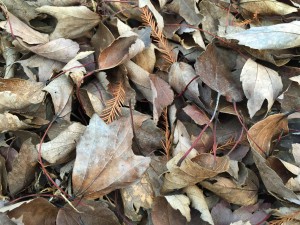This is the time of year when leaves are turning shades of yellow and red and falling from the trees. And this spurs homeowners to get out there with their rakes and rid them from their lawns. This is a good practice as too many leaves will shade out the grass and decrease the quality of the lawn come next spring. So, go ahead and rake them up. However, think about using as many as you can as mulch in other parts of your yard.

Leaves can be placed as mulch in landscape beds “as is” or chopped up with your mower or shredder into finer pieces and then spread around perennials, shrubs and trees. When chopped up or shredded, they tend to stay in place much better and don’t blow around when it gets windy. As the leaves break down over time, their nutrients are released and become available; that’s free fertilizer for your landscape plants. Leaves as mulch do have a natural look in the landscape, so if you prefer a more formal or polished look, you can spread a thin one-inch layer of a commercial mulch over the leaves.
Organic mulches (those made from plants) offer many benefits. They add organic matter and improve soil fertility as they decompose, thus reducing the need for added fertilizers. Mulch helps to maintain soil moisture so less frequent irrigation may be needed. Soil-borne disease can also be prevented as the soil does not splash up on the bottom leaves of plants during periods of rain. One of the favored reasons to use mulch is to prevent weeds in your landscape beds. And, of course, mulch is much prettier to look at than bare ground!
So how deep should you apply mulch? University of Florida experts advise a 3 to 4 inch layer of mulch around shrubs and trees. However, keep mulch from setting against the stems and trunks as that can cause moisture and pests to adversely affect them. Place just a thin one-inch layer of mulch over the rootballs of your plants.
Using leaves as mulch recycles a natural resource and saves you money, enriches your soil, fertilizes your plants and keeps them out of the local landfill.
For more information:
Landscape Mulches: What Are The Choices in Florida?
 0
0
